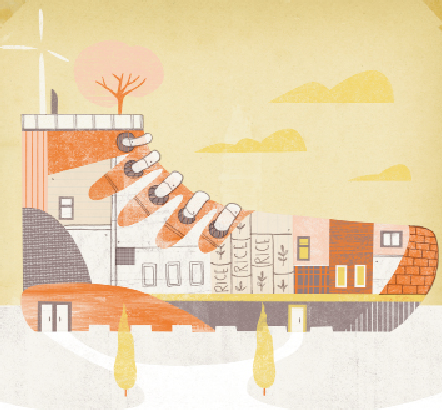
The shoe industry is plagued by problems but one company is the belle of the ball.
Shoes are funny things. They let you go to the ball, make you a talking point at the Olympics, betray your socioeconomic status – oh, and protect your feet. They’ve also been the target of some of the loudest human rights complaints of the last two decades.
A 2009 Consumers International report found that although sports shoes are complicated to manufacture, involving up to 50 component parts, just 0.4 percent of the average retail price is spent on labour. To put that in perspective, 8.5 percent goes towards advertising them.
And among the sportswear giants it’s a smaller company that’s the belle of the ball.
Footwear, bag and sock brand Keen’s activities read like a checklist for running a sustainable business.
Let’s start with its new global HQ, a 105-year-old brick warehouse in Portland, Oregon. When Keen bought the building in 2012, it was full of dated office fixtures, including a two-storey spaceship-like conference room of dubious aesthetic value. But it set itself the challenge of renovating the entire space – all five floors and 50,000 square feet – without sending more than a single dumpster to landfill.
Mesh cubicle walls became modernist mezzanine railings, fir ceilings became flooring and an old bowling alley surface found a new life as a meeting room table. Drywall, lumber and metal that couldn’t be reused in construction went to local recyclers, while shelving was donated to a local school, cabinets and countertops to Habitat for Humanity, and insulation to the Rebuilding Center of Portland.
“Anything that could be recycled we pulled out and sent to the local recyclers, then we took any material that could be harvested and turned that into other materials that still exist in the building today,” explained project manager Rob Fenty. He estimates similar-sized building projects would ordinarily have sent 30 dumpsters to landfill.
And that’s just the beginning. Keen’s products feature recycled inner tires, aluminium, airbags, rice sacks and polyester, although you wouldn’t know it – they don’t look like the kind of thing made by crafters with a conscience hoping to make a quick buck on Etsy. (Airbags, it turns out, are sturdy and waterproof and make great backpacks).
Shoes are manufactured by a process called vulcanisation (sealing the layers together at a high heat) so that chemically intense adhesive isn’t required. Some footwear is made in Portland at a factory Keen opened in 2010, despite the fact this kind of ‘insourcing’ is far from the cheapest option for manufacturing footwear. Bags and socks come from North Carolina; the rest of the shoe range from factories in China, the Dominican Republic and Vietnam, some of which are intentionally located close to raw materials such as rubber to reduce transportation emissions.
And then there’s the cleverly generous side to the company. In 2012, Keen took over a local school for its global sales conference, donating what they’d normally pay for a convention centre to the school’s upkeep. Keen has given more than $7 million to different causes in its 10 years of existence, from protecting wildlife to preserving national parks, aiding distaster relief – and encouraging children to get out and play. It hasn’t stopped them continuing to be one of the fastest-growing outdoor brands in the world.
Sure, Keen’s still got challenges – making its offshore suppliers conform to its standards 24/7 being one of them – but it’s rare to find a brand that understands that sustainability is a process, not something you try and then stop, like your New Year’s resolution to learn French.
Call me romantic, but it’s nice to know that behind the product is a company whose values are the same as yours. I’d argue it’s even better than having an optically challenged royal turn up with your missing shoe.




